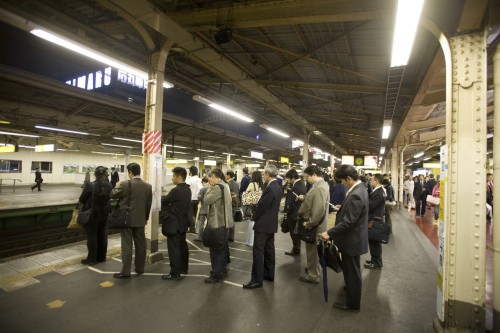When I wrote a post about customer service in Japan, my good friend JP – a Brazilian hip-hop dancing missionary in Tokyo [Edit: turns out it was the other JP I know. He’s a German snowboarding missionary in Japan] – wisely pointed out the flip-side of that super cheery and helpful service. He’s kindly let me quote him,
“Beneath the nice surface of supreme customer service people are suffering from the immense pressure as they have to perform and fulfill what is expected from them.”
This is true. And it highlights the tension I feel about Japan. I really do have a love/hate relationship with Japan. And the love I feel for Japan is highlighted by the stuff that I hate. In fact if I didn’t love Japan so much I imagine I wouldn’t really care about the negative stuff in Japanese culture.
For instance Japanese has a brilliant word, which is also a terrible word: ‘Ganbaru’ (頑張る in case you wondered what the Japanese looks like).
It’s one of those impossible-to-translate-into-a-single-English-word words. People tend to translate it as “do one’s best” which is probably as close as you can get.
The reason I love this word, is that it is a great encouragement to shout to someone. ‘Ganbatte!’ – “Do your best!” “Go for it!” In some situations you could maybe even translate it as, “I’m rooting for you!”
The problem is that ‘Ganbaru’ can easily turn into a demand. People will say to themselves, ‘Ganbaranaito…’ – “I must try harder…” “I must keep going…”
But, as JP highlighted, we need rest. To keep pushing yourself on, because of felt expectations to ‘do one’s best’ can be dangerous. Very dangerous. People die from the stress. So often that overwork is now an official cause of death in Japan. There’s a word for it: ‘Karoushi’ – literally, ’overwork death.’
And this is not limited to salarymen. High school kids, and even younger children, feel the pressure to work harder than is physically possible for them in order to get into the best universities. To not to let down their school and family. Bullying, ‘hikkikomori,’ suicide – the problems caused by this pressure are real and tragic.
I don’t think this pressure is necessitated, or caused, by the Japanese commitment to customer service. But it can distort it. To quote JP again,
“Every nice extra service is paid for by time and energy not spent with the family or for recreation. Many Japanese break down under this immense pressure to perform on this high level, there are many who are not able to give themselves as it is required and the question is where will they end up? The friendliness and kindness and supreme service here in Japan has a price and people pay with their health and lives.”
So JP, I totally get you. I’m sorry for painting a lop-sided picture of Japan (I’ll send you a Bounty to make up for it). I do love the Japanese dedication to customer service. But I emphatically do not love the work ethic that says people should provide that service even if it costs them their health, happiness, family, or life.

Great post Levi. I linked to in on my blog today.
LikeLike
Hey Wendy, thanks for that. I appreciate it.
LikeLike
I’ve only just discovered your blog Levi and I’m enjoying what I’ve seen already. Happy to encourage a fellow blogger!
LikeLike
Haha, I think vanilla and choco JP got mixed up, but please go ahead and sent brasirujin JP a bounty 😉
ドイツ人のJP
LikeLike
Oh psych! I should have known from the lack of “Mega blessings!” Sorry dude, I hope you don’t mind me quoting you? I could direct the Bounty your way instead, or… we have a bit of Stollen leftover from Christmas?
Anywho, I’d be keen to hear your thoughts. Do you think I’ve struck the right balance?
LikeLike
Toast is perfectly cooked half a minute before it turns black and Inedible. A person has done their best about some time shortly before they die. How else can you tell that they have done everything possible?
LikeLike
I think that’s a good analogy, Ash. If you have a culture that takes work and responsibility seriously, but lacks a concept of Sabbath/rest then people are going to push themselves too far, just so that they can prove that they’ve pushed themselves far enough.
LikeLike
Pingback: Which is harder: getting into a Japanese university or getting into the kingdom of God? | Reversed Thunder